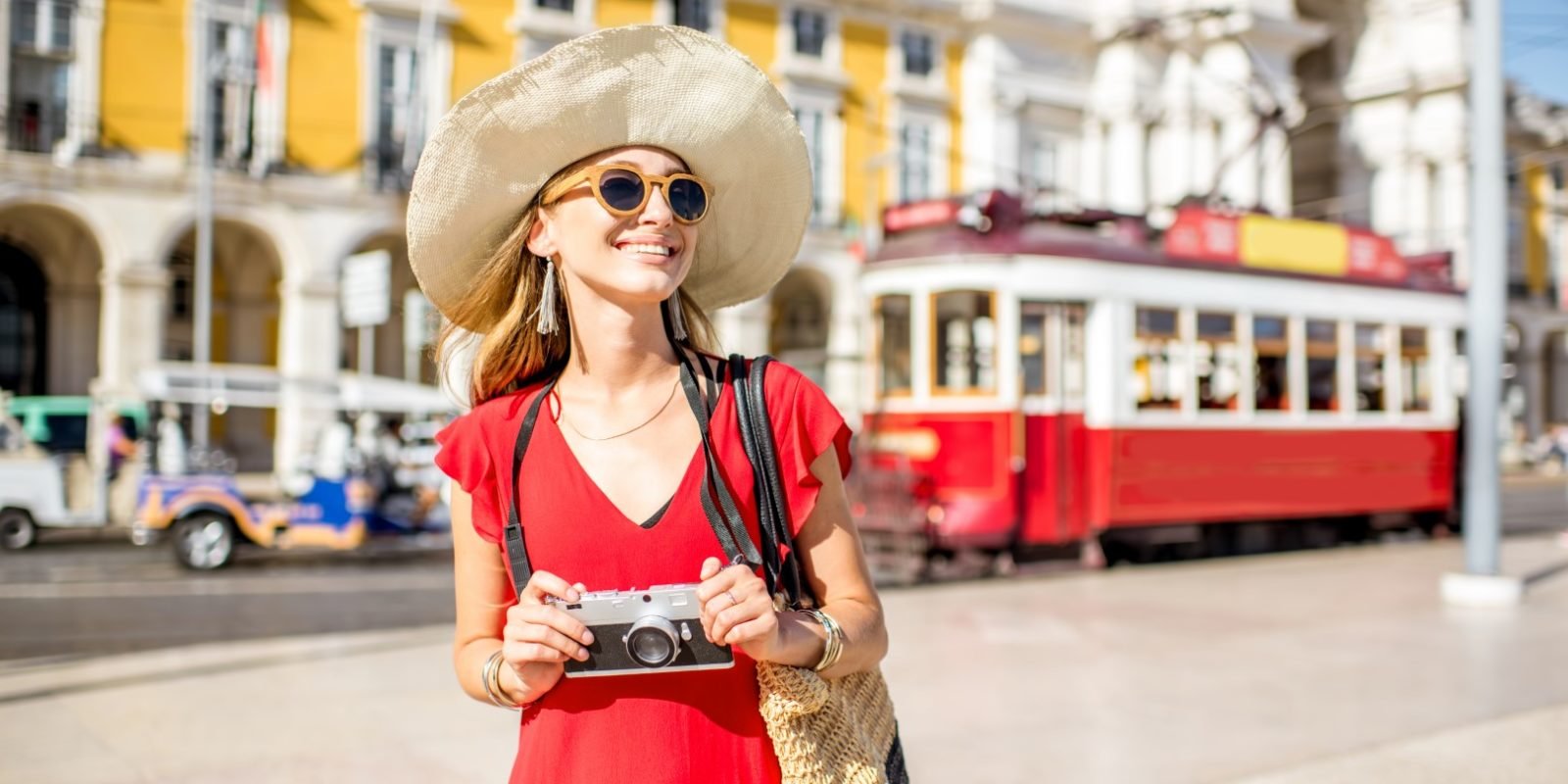Portugal is a great family-friendly destination with something for everyone, from stunning beaches to cultural attractions like castles and museums, delicious cuisine, and welcoming locals. Whether you’re looking for an adventure-filled holiday or a more relaxing getaway, Portugal has plenty to offer families of all ages and interests. Consider a family trip to Portugal for these reasons:
- Beaches: Portugal boasts some of the most beautiful beaches in Europe, making it an ideal destination for families looking to soak up the sun and play in the sand.
- History and Culture: Portugal has a rich history and culture, with fascinating landmarks like castles, museums, and historical sites, offering plenty of opportunities for educational family outings.
- Food: Portuguese cuisine is delicious and diverse, with plenty of kid-friendly options, such as fresh seafood, grilled meats, and tasty desserts like pastéis de nata.
- Activities: There are plenty of fun-filled activities for families in Portugal, from water sports like surfing and paddleboarding to hiking, cycling, and exploring nature reserves.
- Climate: Portugal has a mild climate all year round, making it an ideal destination for families looking to escape the cold winters of northern Europe.
- Affordable: Portugal is relatively affordable compared to other European destinations, making it an attractive option for families on a budget.
- Safety: Portugal is considered one of the safest countries in Europe, making it a reassuring destination for families traveling with children.
Things to Do in Portugal With Kids
Here are some things to do during your family trip to Portugal:
- Visit the beaches: Portugal is home to some of the most beautiful beaches in Europe, including Praia da Rocha, Praia da Rocha Baixinha, and Praia de Carvoeiro, which offer plenty of opportunities for swimming, sunbathing, and building sandcastles.
- Explore historical sites: Portugal is rich in history, with many castles, forts, and museums to explore, such as the Castelo de São Jorge in Lisbon or the Convento de Cristo in Tomar.
- Take a boat trip: Portugal has many scenic waterways, and a boat trip along the Douro River or along the coast of the Algarve is a great way to see the country from a different perspective.
- Go on a nature walk: Portugal has many nature reserves, such as the Ria Formosa Natural Park and the Sintra-Cascais Natural Park, which offer plenty of opportunities for hiking, cycling, and wildlife spotting.
- Visit amusement parks: Portugal has several amusement parks, such as Zoomarine, where kids can see dolphins, seals, and sea lions up close, as well as enjoy rides and attractions.
- Taste Portuguese cuisine: Portuguese cuisine is delicious and diverse, with plenty of kid-friendly options, such as fresh seafood, grilled meats, and tasty desserts like pastéis de nata.
- Attend a festival or event: Portugal has many festivals and events throughout the year, such as the Carnival of Torres Vedras, where kids can enjoy colorful parades and street performances.
- Take a surfing lesson: Portugal is a popular destination for surfers, and many surf schools offer lessons for kids of all ages and abilities.
- Visit a water park: Portugal has several water parks, such as Aquashow and Slide & Splash, which offer a range of water slides, pools, and attractions.
- Explore theme parks: Portugal has several theme parks, such as Portugal dos Pequenitos, which is dedicated to showcasing Portuguese culture and history in a fun and interactive way.
Want to know more? Discover more Things to Do in Portugal With Kids.
Where to Go for Your Family Trip to Portugal
Many great destinations in Portugal are perfect for families with kids. Here are some ideas:
- Lisbon: Portugal’s capital city has plenty of attractions that will appeal to kids, such as the Lisbon Oceanarium, the Castelo de São Jorge, and the Parque das Nações.
- Algarve: This region in the south of Portugal is known for its beautiful beaches and warm climate, making it a great destination for families looking to soak up the sun.
- Porto: This historic city in the north of Portugal is famous for its wine, but it also has plenty of family-friendly attractions, such as the Serralves Museum, the Livraria Lello bookstore, and the Dom Luis I Bridge.
- Madeira: This beautiful island off the coast of Portugal has a mild climate all year round, making it a great destination for families looking for a warm and sunny holiday.
- Sintra: This town near Lisbon is home to several historic palaces and castles, such as the Pena Palace and the Castle of the Moors, as well as beautiful gardens and hiking trails.
- Cascais: This coastal town near Lisbon has a charming historic center, as well as several beautiful beaches and a popular marina.
- Coimbra: This university town in central Portugal has several historic landmarks, such as the Biblioteca Joanina and the Convento de Santa Clara-a-Nova, as well as beautiful parks and gardens.
- Tomar: This historic town in central Portugal is home to the Convento de Cristo, a UNESCO World Heritage site, as well as several other historical landmarks and museums.
- Guimarães: This historical city in northern Portugal is considered the birthplace of Portugal, and it has several historic landmarks, such as the Castle of Guimarães and the Paço dos Duques de Bragança.
- Viana do Castelo: This coastal town in northern Portugal has several beautiful beaches, as well as historical landmarks such as the Santuário de Santa Luzia and the Navio Hospital Gil Eannes.
Check out our article on The Best Cities to Visit in Portugal.
Where to Stay During Your Family Trip to Portugal
There are many options for family-friendly accommodation in Portugal. Here are some suggestions:
- Family-friendly hotels: Many hotels in Portugal cater specifically to families, with features like children’s play areas, swimming pools, and activities. Some great options include Martinhal Lisbon Cascais Family Hotel, Martinhal Sagres Beach Family Resort, and Vila Gale Hotels.
- Self-catering apartments or villas: If you prefer to have more space and flexibility, renting a self-catering apartment or villa can be a great option. Websites like Airbnb and HomeAway have many options for family-friendly accommodation, often with amenities like kitchens, laundry facilities, and outdoor spaces.
- Resorts: Portugal has several resorts that are ideal for families, with facilities like kids’ clubs, swimming pools, and entertainment. Some popular resorts include Pine Cliffs Resort, Praia D’El Rey Marriott Golf & Beach Resort, and Vilamoura Beach Resort.
- Camping: Camping is a popular activity in Portugal, and many campsites are suitable for families. Some great options include Orbitur Camping, Parque de Campismo de S. Miguel, and Camping Guincho.
- Farm stays: For a unique and educational experience, consider staying on a farm in Portugal. Many agritourism properties offer activities like animal feeding, horseback riding, and cheese making. Some great options include Monte da Casteleja, Quinta da Samoqueirinha, and Herdade da Matinha.
Which areas are best for families? Discover The Best Places to Stay in Portugal.
What to Eat in Portugal With Kids
Portugal has a rich culinary heritage that includes many dishes that are sure to appeal to kids. Here are some ideas for what to eat on your family trip to Portugal:
- Grilled sardines: Sardines are a staple of Portuguese cuisine, and they are often grilled and served with bread and roasted peppers. They are a healthy and tasty option that kids may enjoy.
- Pastel de nata: These famous custard tarts are a must-try when visiting Portugal. They are sweet and creamy and can be found in bakeries all over the country.
- Francesinha: This sandwich from Porto is made with bread, ham, sausage, and steak and is covered in melted cheese and a spicy tomato sauce. It’s a hearty and flavorful meal that kids may enjoy.
- Bacalhau: This salt cod dish is a staple of Portuguese cuisine, and there are many variations to try. Kids may enjoy the simpler versions, like bacalhau à Brás, which is made with shredded cod, eggs, and potatoes.
- Piri piri chicken: This spicy grilled chicken is a popular dish in Portugal and is often served with fries or rice. Kids who like spicy food may enjoy this flavorful dish.
- Caldo verde: This hearty soup is made with potatoes, kale, and sausage, and is a popular comfort food in Portugal. It’s a healthy and satisfying option that kids may enjoy.
- Arroz de marisco: This seafood rice dish is a specialty of the Algarve region, and is made with a variety of shellfish and rice. It’s a flavorful and filling meal that kids who like seafood may enjoy.
- Chouriço assado: This grilled sausage is often served as an appetizer, and is a great option for kids who like meat. It’s flavorful and easy to eat with bread.
What to Wear in Portugal
What to wear for your family trip to Portugal depends on the time of year and the activities you plan to do. Here are some general tips:
- Summer: In the summer months (June to August), Portugal can be hot and humid. Lightweight, breathable clothing is recommended, as well as sunscreen, sunglasses, and a hat. Sandals or comfortable walking shoes are a good choice for footwear, as you may do a lot of walking on uneven terrain.
- Spring and autumn: In the shoulder seasons (March to May and September to November), the weather can be mild but unpredictable. Bringing layers is a good idea, as the temperature can change quickly. A light jacket or sweater may be necessary for the evenings.
- Winter: In the winter months (December to February), Portugal can be chilly and rainy, particularly in the north. A warm coat, waterproof shoes, and an umbrella are recommended. Bringing layers is a good idea, as indoor heating may vary.
- Beachwear: If you plan to visit the beaches, bring swimwear, a cover-up, and a towel. Some beaches may be rocky, so water shoes or sandals are recommended.
- Cultural sites: When visiting cultural sites like churches and museums, it’s important to dress respectfully. Shorts, sleeveless tops, and revealing clothing may not be allowed in some places. It’s a good idea to bring a shawl or scarf to cover your shoulders if needed.
Overall, Portugal is a fairly casual country, and comfortable clothing and shoes are recommended for sightseeing and outdoor activities.
When to Go to Portugal
The best time to go to Portugal depends on your preferences and what you want to do. Here is some information about the weather and events in Portugal throughout the year:
- Summer (June-August): Summer is the most popular time to visit Portugal, with warm temperatures and lots of sunshine. It’s a great time to enjoy the beaches, outdoor activities, and festivals. However, it can also be crowded and more expensive.
- Spring (March-May): Spring is a good time to visit Portugal, with milder temperatures and fewer crowds. The countryside is green and flowers are in bloom, making it a beautiful time to explore. However, the weather can be unpredictable, with occasional rain.
- Autumn (September-November): Autumn is another good time to visit Portugal, with warm temperatures and fewer crowds. The vineyards are busy with harvest season, and there are many food and wine festivals to enjoy. However, it can also be rainy.
- Winter (December-February): Winter is the low season in Portugal, with cooler temperatures and occasional rain. However, it can also be a good time to visit for lower prices and fewer crowds. The cities are decorated for Christmas, and there are many cultural events and concerts.
Overall, Portugal is a great destination year-round, depending on your preferences. If you want to avoid the crowds, consider visiting in the shoulder seasons of spring or autumn. If you want to enjoy the beaches and outdoor activities, summer is the best time to go.
How Long to Stay in Portugal
The amount of time you should stay in Portugal depends on your interests and the places you want to visit. Here are some suggestions for how long to stay in Portugal based on some popular itineraries:
- Lisbon and Porto: If you want to visit the two main cities of Portugal, plan to stay for at least 5-7 days. This will give you enough time to explore the historic districts of Lisbon, visit museums, and enjoy the nightlife. In Porto, you can tour the port cellars, stroll along the riverfront, and visit the nearby beaches.
- Beach holiday: If you want to enjoy the beaches of Portugal, plan to stay for at least a week. The Algarve region in southern Portugal is known for its beautiful beaches, with plenty of opportunities for water sports and relaxation.
- Road trip: If you want to explore the countryside and smaller towns of Portugal, plan to stay for at least 10 days. This will give you enough time to rent a car and drive along the coast, visit the medieval town of Obidos, explore the Douro Valley wine region, and enjoy the natural parks.
- Food and wine tour: If you want to sample the food and wine of Portugal, plan to stay for at least a week. You can explore the vineyards of the Douro Valley, visit the seafood restaurants in Porto, and enjoy the traditional dishes in Lisbon.
Overall, Portugal has many attractions to offer, and the length of your stay will depend on your interests and preferences. Plan to spend at least a week in Portugal to get a taste of what the country has to offer.
1-Week Portugal Itinerary With Family
If you have one week to spend on your family trip to Portugal, here is a suggested itinerary:
Day 1-3: Lisbon
- Explore the historic districts of Lisbon, such as Alfama and Baixa
- Visit the Castelo de São Jorge and the Belem Tower
- Take a tram ride on the famous Tram 28
- Visit the Oceanário de Lisboa, one of the largest aquariums in Europe
- Enjoy the local food and nightlife in the Bairro Alto and Chiado districts
Day 4: Sintra
- Take a day trip to Sintra, a UNESCO World Heritage Site known for its palaces and gardens
- Visit the colorful Pena Palace and the romantic Quinta da Regaleira
- Enjoy the scenic views from the Castelo dos Mouros
Day 5-6: Algarve
- Head south to the Algarve region, known for its beaches and resorts
- Relax on the beaches of Praia da Rocha or Praia de Benagil
- Take a boat tour to explore the sea caves along the coastline
- Visit the Zoomarine theme park for dolphin shows and water slides
Day 7: Lagos and Faro
- Visit the historic town of Lagos, with its charming streets and churches
- Explore the Ria Formosa Natural Park, a protected wetland area
- End the trip in Faro, the capital of the Algarve, with its museums and medieval walls
This itinerary can be adjusted based on your interests and the age of your children, but it provides a good balance of culture, history, and beach time.
Have more time? Here’s The Ultimate 2-Week Portugal Itinerary.
How to Get Around Portugal
There are several ways to get around Portugal, including:
- Public transportation: Portugal has a good network of public transportation, including buses, trains, and trams. The public transportation is affordable and generally reliable, making it a great option for budget travelers.
- Car rental: Renting a car is a popular option for those who want to explore the countryside and smaller towns of Portugal. There are many car rental companies available, and the roads are generally well-maintained and easy to navigate.
- Taxis and rideshare: Taxis and rideshare services like Uber and Bolt are available in Portugal, especially in the larger cities. Taxis are more expensive than public transportation, but they can be a convenient option for short trips or for those who prefer not to drive.
- Walking and cycling: Portugal is a great country for walking and cycling, with many scenic routes and trails. Walking is a great way to explore the historic districts of Lisbon and Porto, while cycling is popular in the Algarve and Douro Valley regions.
Overall, the best way to get around Portugal depends on your itinerary and preferences. Public transportation is a good option for those on a budget, while renting a car gives you more flexibility to explore the countryside. Walking and cycling are great options for those who want to enjoy the scenery and stay active.
How Much to Travel to Portugal
The cost of traveling to Portugal depends on several factors, such as the time of year, the duration of your trip, and your travel style. Here are some general costs to consider when planning a trip to Portugal:
- Accommodation: The cost of accommodation in Portugal can vary greatly depending on the location and type of accommodation you choose. Budget travelers can find hostels or budget hotels for around €20-€50 per night, while mid-range hotels cost between €50-€100 per night. Luxury hotels and resorts can cost upwards of €150 per night.
- Food and drinks: Portugal is known for its delicious food and wine, and there are many affordable options available. A meal at a local restaurant can cost between €10-€20 per person, while a glass of wine or beer costs around €2-€4. Supermarkets and markets offer budget-friendly options for those who prefer to cook their meals.
- Transportation: Public transportation is affordable in Portugal, with a single ticket on the metro or bus costing around €1.50-€2.50. Renting a car can cost around €30-€50 per day, depending on the type of car and rental agency.
- Activities: There are many free or low-cost activities in Portugal, such as visiting museums and historic sites. Excursions and tours can cost between €20-€50 per person, depending on the activity and duration.
Overall, budget travelers can expect to spend around €50-€80 per day, while mid-range travelers can expect to spend between €80-€150 per day. Luxury travelers can expect to spend upwards of €200 per day. These are rough estimates and can vary depending on your travel style and itinerary.




